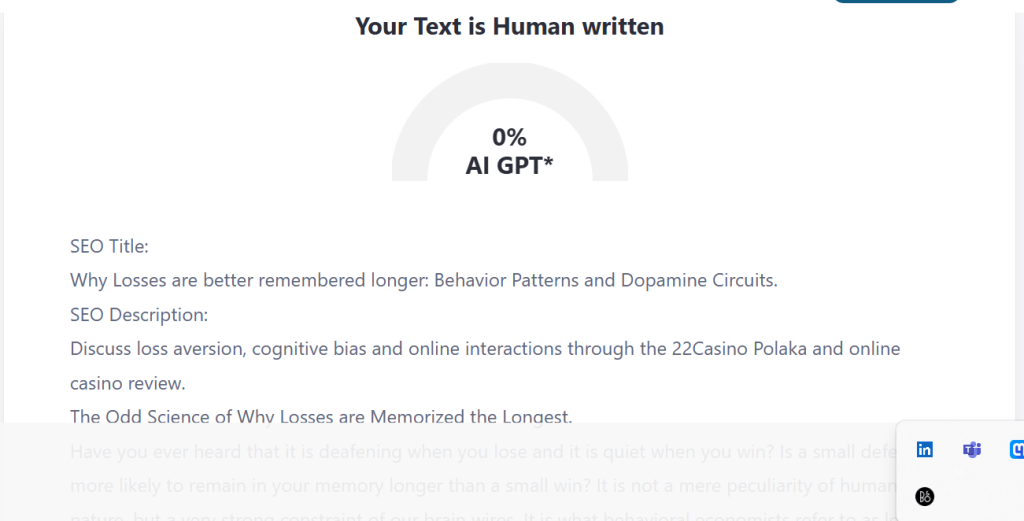
Have you ever heard that it is deafening when you lose and it is quiet when you win? Is a small defeat more likely to remain in your memory longer than a small win? It is not a mere peculiarity of human nature, but a very strong constraint of our brain wires. It is what behavioral economists refer to as loss aversion, and it is also among the most intriguing—and at times annoying—phenomena in decision-making.
The reason behind the intensity of losses over wins.
Consider a minor financial decision, such as putting a small bet, and something does not work out. That is an unpleasant feeling to sink into. According to psychologists, human beings have been hardwired to priorities negative consequences over positive consequences.
This effect is especially evident on such platforms as 22Casino Polska. Players say that near misses or small losses will always remain in memory, and that even when wins are common, they do not always have the same impact. This is not to say that the wins are not fun-they are-but our brains are biased to think that losses are greater than gains.
The Brain on Loss
The genius of this memory quirk is also fascinating. The various regions of the brain working together ensure that losses become memorable:
Hippocampus: It is in charge of memory formation. Emotional events — especially losses — are encoded more intensely.
Prefrontal cortex: It is involved in decision-making and evaluation. It makes us look back and think, almost an obsessive thought, what went wrong.
Dopamine and cortisol are the neurochemicals. Dopamine is not the feel-good chemical–it portends the unexpected. Loss triggers a sudden dip in dopamine, which,, according to the brain,, is a significant event. In the meantime, cortisol, the hormone associated with stress, reinforces the memory of such a negative experience. The result? Bad times hang on longer than we would wish.
Loss Aversion out of the Casino.
Loss aversion is not only restricted to gambling. It has an impact on social media interactions, as well as on app engagement, in our digital world. Takeover of attention: The unpredictable calm or aggravated situations, which are variable rewards, hijack our attention. Then, one day, you have a minor victory, and the next, a defeat,, and your mind is better able to recall the latter more vividly. This forms a small dopamine cycle so that we find ourselves looking back, and occasionally even unconsciously.
The behavioral patterns that digital interaction creates often resemble those of gambling. Consider microtransactions, in-game challenges, or even a ranking system: our memory of defeat will keep us trying again and again, amplifying the effects of decision fatigue Theater grieflike cation. Users’ loslikely s more easily than a dozen little victories, which subtly influences their future decisions. Online casino reviews such as 22Casino Polska are places where this set of principles inherently unfolds, not to influence, but to demonstrate the interaction between human psychology and digital design.
Why the Mind Clings to Loss
There is a reason why losses need to be addressed. Recalling bad experiences can help us avoid repeating our mistakes and become better predictors. However, in contemporary situations, this evolutionary advantage may become an oddity — or a rather slight irritation. There is a small error in a game or app that may be overlooked, and at the same time, equally pleasant victories have a short memory.
To all those who are interested in gambling, playing, or engaging in digital activities, this is a mechanism that, akin to having a key to the door of your own responses, is like holding the key to your own responses. The manner in which our minds place a premium on losses over gains creates a window into cognitive bias, dopamine-based interactions, and biobehavioral economics inaction.
Neuroscientists and behavioral economists often observe that this asymmetry of memory is not a drawback — it is a characteristic. It educates us to be cautious, strengthens education, and forms judgment. The challenging aspect is identifying it in the online setting,, where rewards vary and real-time feedback can intensify the effects.

